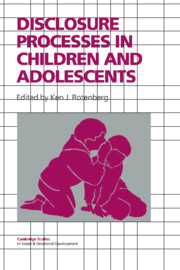Book contents
- Frontmatter
- Contents
- List of contributors
- 1 Disclosure process: an introduction
- 2 Patterns and functions of self-disclosure during childhood and adolescence
- 3 Intimacy and self-disclosure in friendships
- 4 Self-disclosure and the sibling relationship: what did Romulus tell Remus?
- 5 Lonely preadolescents' disclosure to familiar peers and related social perceptions
- 6 Children's disclosure of vicariously induced emotions
- 7 Moral development and children' differential disclosure to adults versus peers
- 8 Parential influences on children's willingness to disclose
- 9 Disclosure processes: issues for child sexual abuse victims
- 10 Self-disclosure in adolescents: a family systems perspective
- Author index
- Subject index
7 - Moral development and children' differential disclosure to adults versus peers
Published online by Cambridge University Press: 29 August 2009
- Frontmatter
- Contents
- List of contributors
- 1 Disclosure process: an introduction
- 2 Patterns and functions of self-disclosure during childhood and adolescence
- 3 Intimacy and self-disclosure in friendships
- 4 Self-disclosure and the sibling relationship: what did Romulus tell Remus?
- 5 Lonely preadolescents' disclosure to familiar peers and related social perceptions
- 6 Children's disclosure of vicariously induced emotions
- 7 Moral development and children' differential disclosure to adults versus peers
- 8 Parential influences on children's willingness to disclose
- 9 Disclosure processes: issues for child sexual abuse victims
- 10 Self-disclosure in adolescents: a family systems perspective
- Author index
- Subject index
Summary
Imagine the following situations: (1) Your child has failed a test miserably and is too ashamed to admit it. (2) You search around your house for your cigarettes and find a cigarette butt just outside of your child's room. (3) Your child seems really dozy and his eyes glassy after making model airplanes in his room. (4) You are a storekeeper and you notice a gradual but obvious loss of candies handled by one of the children assisting you. Did the child fail a test, smoke, sniff glue, or steal candies? The answers to these questions frequently depend on the child's willingness to disclose his or her negative feelings and behaviors to adults. Moreover, the extent to which the child is willing to and actually does disclose will most likely play a significant role in parents' and other adults' ability to cope with a child's problems and engage in appropriate disciplinary actions.
Also imagine the following situations: (1) Your child does really well in a test at school and he or she is very proud but too timid to brag about it. (2) Your child has a “crush” on someone. (3) Your are a teacher and one of your students has a good idea for a class project. (4) You are a storekeeper and one of the children assisting you has been helpful to the customers.
- Type
- Chapter
- Information
- Disclosure Processes in Children and Adolescents , pp. 135 - 147Publisher: Cambridge University PressPrint publication year: 1995
- 4
- Cited by



